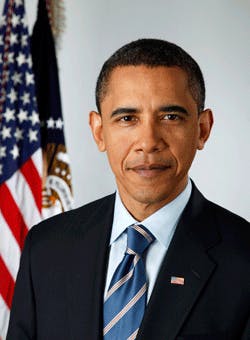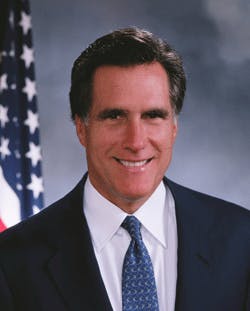Campaign for president highlights issues confronting U.S. auto industry
As the presidential race approaches the finish line, arguments over shifting automotive trends, government aid for automakers and trade-balance issues with China are fueling a series of increasingly pointed barbs between President Barack Obama and challenger Mitt Romney.
Ohio is especially in the driver’s seat based on its role as a key swing state at the ballot box and a significant industry manufacturing presence that is second only to Michigan. The competing campaigns and their respective supporters have been pushing their automotive-oriented points via rallies, speeches and aggressive advertising aimed at swaying the vote.
Like this article? Sign up for our enews blasts here.
“When Governor Romney said we should let Detroit go bankrupt, we said, ‘Thanks, but no thanks,’” declared Obama during a speech at Ohio University in Athens. “We won’t take your vast business advice. We’re going to support the auto industry. We’re going to bet on American workers because we knew that one in eight Ohio jobs is supported by the auto industry. And that industry has come roaring back to the top of the world.”
Drawing a crowd of 14,000, Obama’s October address took place at the exact same spot on OU’s campus where former President Lyndon Johnson made the first public pronouncement of his Great Society anti-poverty program in 1964.
Obama used the historic occasion to bring forth a fresh broadside directed at Romney: “He’s got a tax plan that doesn’t add up. He’s got a jobs plan that doesn’t create jobs. He’s got a deficit plan that doesn’t reduce the deficit. You’ve heard of the New Deal, you’ve heard of the Fair Deal – Mitt Romney’s trying to sell you a Sketchy Deal. But we’re not buying it. We know better, because this is the same Sketchy Deal that we were sold back in the previous administration. We tried it. It didn’t work. We’re not going back. We’re moving.”
During the Town Hall debate at Hofstra University in Hempstead, N.Y., Romney asserted, “I know he keeps saying, ‘You wanted to take Detroit bankrupt.’ Well, the president took Detroit bankrupt. You took General Motors bankrupt. You took Chrysler bankrupt. So when you say that I wanted to take the auto industry bankrupt, you actually did.”
Horses, bayonets and battleships briefly took a back seat during the foreign policy debate at Lynn University in Boca Raton, Fla. The competitors again swapped paint over the GM and Chrysler bailouts, Chinese tire imports and China’s trade policies regarding auto parts.
Romney denounced the Obama administration’s funding of the Fisker and Tesla electric vehicle lines. “Research is great. Providing funding to universities and think tanks – great. But investing in companies? Absolutely not. That’s the wrong way to go,” he said. “It’s not government investments that make businesses grow and hire people.”
Obama touted the tariffs placed on “cheap Chinese tires” being imported into the U.S. “We put a stop to it and, as a consequence, saved jobs throughout America. I have to say that Governor Romney criticized me for being too tough in that tire case, said this wouldn’t be good for American workers and that it would be protectionist. But I tell you, those workers don’t feel that way. They feel as if they had finally an administration who was going to take this issue seriously.”
Chiding Romney for his previously published statements that the tire tariffs were “bad for our nation and our workers,” Obama lauded the administration’s ongoing actions in taking on China’s stance toward auto parts.
While taking care to steer clear of presidential politicking, several industry associations are endorsing the case recently filed with the World Trade Organization (WTO) that accuses China of engaging in unfair trade practices.
“The facts in the case are indisputable,” said Scott Paul, executive director of the Alliance for American Manufacturing (AAM). “China is subsidizing its auto parts sector, blocking our exports and causing significant harm to workers and businesses in our nation. Our auto assembly sector, now back on its feet, could be undercut by China’s cheating, causing irreparable damage to the heart of America’s productive economy,” he added.
“For the past eight months,” said Paul, “we have built a compelling case on the merits of moving forward with a trade enforcement action on Chinese auto parts and automobiles.”
Amounting to some 1.6 million jobs in the U.S., parts manufacturing accounts for 75 percent of the employment within the entire American auto industry, according to Paul, who cited $27.5 billion in Chinese government subsidies to its auto parts industry from 2001 through 2011. He further noted that China’s central government has committed to providing an additional $10.9 billion in subsidies for “industrial restructuring and technological development” plans.
Saluting both the executive branch and a non-partisan lineup of 188 U.S. senators and representatives that has pushed for pursuing the WTO filing, Paul said the future for domestic parts-making jobs looks more promising because “we now have a fighting chance to save and grow them.”
Established in 1995 and based in Geneva, Switzerland, the WTO reports that its main mission is to “ensure that trade flows as smoothly, predictably and freely as possible” among the 157 member nations.
China, which joined in 2001, is thus far indicating that it will cooperate with the WTO’s pending investigation. A timetable for reaching a ruling has not yet been set; it is possible that the matter can be resolved through negotiations between China and the U.S.
While cautioning U.S. Trade Representative Ron Kirk to “recognize the increasingly globally integrated nature of the automotive aftermarket and the potential for unintended consequences to a significant sector of the U.S. economy,” the Automotive Aftermarket Industry Association (AAIA) says that it welcomes “a thorough and objective” review.
“AAIA is committed to fairness in the international trading system and supports efforts to ensure that WTO members abide by their commitments,” said President and CEO Kathleen Schmatz. “We encourage (Kirk) to work towards a solution through the bilateral consultation phase of the WTO dispute settlement process in order to avoid a prolonged arbitration and appeal process and potential Chinese retaliation aimed at the U.S. automotive aftermarket.”
Bob McKenna, president and CEO of the Motor & Equipment Manufacturers Association (MEMA), said his organization “will closely examine this case” and monitor the potential impact on its membership as the matter moves forward.
“With an increasingly competitive global economy, suppliers and their workers are doubling their efforts to remain competitive at home and abroad where 95 percent of the world’s consumers live,” McKenna pointed out. “In addition to having U.S.-based manufacturing, many MEMA members compete globally, including in China, the world’s largest automotive producer,” he explained. “MEMA members understand the importance of foreign markets, yet also know fair trade needs to be defended in today’s international marketplace.”
Referring to the latest WTO filing as “a different animal” than the tariffs levied by the U.S. on Chinese car and light truck tire imports in 2009 – they expired in September of this year – the Tire Industry Association (TIA) observes that the latest WTO filing “is a continuation of the ongoing efforts of integrating the Asian giant into the world market.”
TIA had opposed the imposition of any tire tariffs.
Chinese tire makers were receiving subsidies ranging from 10.90 to 30.69 percent. The subsequent tariffs – also known as duties or “safeguards” – “mostly benefited other tire exporting countries first and American manufacturers second on these low-cost tires,” according to TIA officials citing a study by the Peterson Institute for International Economics.
Although the Peterson research reports that about 1,200 American jobs were saved, imposing the tariffs also spurred tire makers to shift their production of low-cost tires to other nations such as Korea.
TIA’s director of communications, Mark Cook, tells Aftermarket Business World that “Korea has benefitted greatly” as the tire tariffs “caused a lot of (American) distributors and retailers to find other sources of products to be competitive.”
While not taking an official position on the auto parts filing, Cook said “the good news is that the Chinese are going through the WTO process; both parties are working to resolve this issue.”
Cook went on to say that “having a level playing filed is of paramount importance – keep promoting free and open trade between the two countries so you can make long-range plans” for your aftermarket business prospects. “Make sure there’s a level playing field and the markets are predictable,” he urged.
About the Author
James Guyette
James E. Guyette is a long-time contributing editor to Aftermarket Business World, ABRN and Motor Age magazines.


